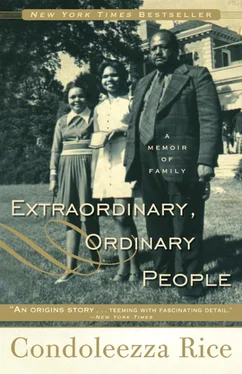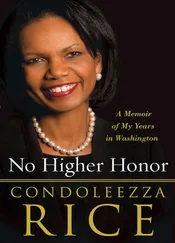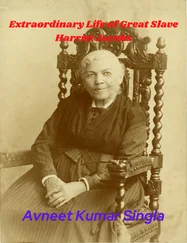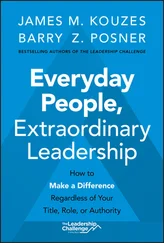Both my mother and her older sister, Mattie, went to Miles College in Fairfield, Alabama. They lived at home and drove to college each day. Both were stunningly beautiful. Mattie looked like her mother, sharing her rich brown complexion, high cheekbones, and long, wavy black hair. My mother looked like her father, fair-skinned with the same round face that I have, and she had long, straight brownish hair. As little girls they were favored by adults because they were so cute. One of my most cherished photographs shows five-year-old Mattie and three-year-old Angelena posing for the local barbershop’s calendar.
In college the Ray girls were popular, with outgoing Mattie becoming a majorette and my more reserved mother breaking out of character by becoming a cheerleader. Mattie, who played high school and collegiate tennis and basketball, was a real athlete. My mother, however, was not. In order to fulfill her physical education requirement, she created a scrapbook. Her teacher gave her a B for the beautiful work but told her he just couldn’t give her an A when she didn’t even break a sweat. She was an artist and a lady, and she didn’t really believe that women should play sports or, heaven forbid, perspire. I can’t remember my mother ever picking up a bat or a ball of any kind, and though she later learned to enjoy spectator sports with my father and me, she never fully came to terms with my tomboy tendencies.
After college Mattie and Angelena continued to live at home. My mother and her sister had many friends, but they were clearly each other’s best friend. Life in segregated Birmingham was in some ways pretty simple: family, church, work, and a social life built around black fraternities and private clubs. Mother and her sister became well-regarded teachers at the same high school, though their perpetual tardiness led their father to set the house clocks far ahead to force them to be on time. They’d been taught music by their mother and grandmother, and on Sundays they played organ and piano for Baptist churches—they were Methodists themselves, but the Baptists paid better.
On the weekend, the girls went to fraternity and social club dances in dresses that Mattie, who could sew beautifully, made from whatever material they liked. They loved clothes. My mother once said that her meager teacher’s salary was already owed to fine clothing stores such as Burger-Phillips and Newberry’s the minute she got it. They took trips to shop in downtown Birmingham, where their really light-skinned acquaintances would “pass” as white so that they could go to lunch counters and bring hot dogs out to their waiting, darker-skinned friends, who could not get served.
My mother had been teaching at Fairfield Industrial High for several years when a new athletic director and assistant football coach was hired. Tall, dark-skinned, and extremely athletic, he was powerfully built and had a deep, resonant voice. And he was a preacher who happened to be single. Mother claimed that John Wesley Rice Jr. first saw her walking down the hallway in a red polka-dot dress and red, very high-heeled strappy shoes. He was leaning against the wall, filing his fingernails and hoping to have a chance to say hello. He claimed that it was she who had made the first move, dressing that way to catch his attention.
Daddy had come to Birmingham after finishing Johnson C. Smith University in Charlotte, North Carolina. He’d started school at Stillman College in Alabama, but when World War II broke out, Granddaddy decided to send him to Smith, where he could attend college and then go on to seminary. Daddy wanted to go into the army but acceded to his father’s wishes. He did do some chaplain’s work for soldiers returning from the front, but I think he always felt a little guilty for not having fought in the war.
In any case, by the time Daddy arrived at Fairfield High School, he had already been pastor of his first church and had worked several jobs simultaneously. On the weekends he played and coached semiprofessional football in Burlington, North Carolina. Sometimes he worked as a waiter to supplement his income, and he even tried opening a restaurant, which failed miserably. Until the day he died he always tipped generously, saying that waiting tables was the hardest work he had ever done.
My paternal grandfather, John Wesley Rice Sr., was born in Eutaw (pronounced “UH-tah”), Alabama. Not many blacks owned land in those days, so my grandfather’s family worked the land of others as sharecroppers. Granddaddy’s father was illiterate, but his mother, my great-grandmother Julia Head, was a freed slave who’d learned to read. It isn’t clear who educated her, since it was illegal to teach slaves to read. But she was apparently a favored house slave, and there is a story that Julia ran Union soldiers off the plantation and protected the horses during the Civil War. Perhaps she thought she’d have to do it again, because until the day she died, she would sit on her porch with a shotgun in her lap and a pipe in her mouth.
According to my father, Granddaddy Rice was not a favored son because, unlike his siblings, he was very dark-skinned. You will notice that I have by now described the skin color of each of my relatives. Unfortunately, it mattered. One of the scars of slavery was a deep preoccupation with skin color in the black community. The lighter your skin, the better off you were. This bias extended to other facial features: thin and “Caucasian” was preferred to thick and “Negroid,” just as straight hair was “good” compared to kinky hair, which was “bad.” The repercussions were significant in my parents’ time, when no self-respecting black school would select a dark-skinned homecoming queen. There was even rumored to be a “paper bag test” for membership in the best clubs—if you were any darker than a paper bag, you needn’t bother to apply.
By the time I came along, skin color and other physical features were less important, though not irrelevant. My father loved that I had my mother’s long hair, despite the fact that mine, unlike hers, was a coarse, thick, and somewhat unruly mop. When I finally cut it in college, it was pretty clear that he thought I’d given up some sort of social advantage. But by then the “black is beautiful” aesthetic and Afro hairstyles had introduced a new concept of what was appealing.
One can imagine, though, what it was like for my very dark-skinned grandfather in the first half of the twentieth century. He was given the worst land to work and not much encouragement from his father. But his mother taught him to read and sent him to school. He had big dreams and loved books. So when he was about nineteen he decided to get a college education. He asked people, in the parlance of the day, how a “colored” man could go to college. They told him about little Stillman College, which was about thirty miles away in Tuscaloosa, Alabama. He saved his cotton and paid the school.
After one year, though, Granddaddy Rice ran out of cotton and had no way to pay his tuition. He was told that he would have to leave. Thinking quickly, he pointed to some of his fellow students. “How are those boys going to college?” he asked. He was told that they’d earned a scholarship and that he could have one too if he wanted to be a Presbyterian minister. Without missing a beat, Granddaddy Rice replied, “Well, that’s exactly what I had in mind.” As they would do several times in my family’s history, the Presbyterians educated this young black man.
John Wesley Rice Sr. soon met Theresa Hardnett, a pretty half-Creole from Baton Rouge. The Hardnett family produced educated girls, including two who were among the first black registered nurses to graduate from Booker T. Washington’s Tuskegee Institute. My grandmother, though, left home when she was seventeen and married my grandfather shortly thereafter. She set out with him on his mission of church building and educational evangelism.
Читать дальше












